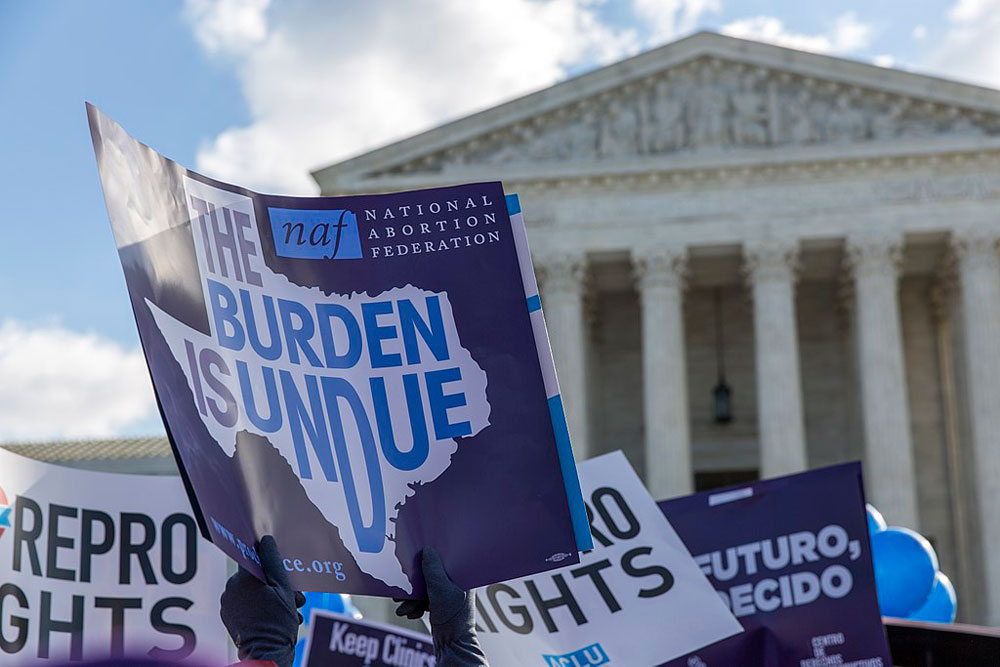
March 4, 2020; Washington Post, Washington Post, New York Times, and Slate
March 4, 2020, was a date both the pro-choice and anti-choice communities had been anticipating with hope and dread. On that day, the Supreme Court, now with a full court and two new justices, Gorsuch and Kavanaugh, who are known for their anti-abortion positions, heard its first abortion case.
The case, June Medical Services v. Gee, concerns a Louisiana law requiring abortion clinic doctors to have admitting privileges at a local hospital. But wait, you say, wasn’t this same case already decided by the Supreme Court three years ago based on the Texas case Whole Woman’s Health v. Hellerstedt and struck down? Well, yes…but the folks in Louisiana claim that Texas is Texas and this is Louisiana, and they are not the same. And the Supreme Court agreed to take this case, making this not only about abortion, but about precedent and about legal principles, such as just who can even bring such a lawsuit before a court. If it sounds complicated, it is. But at the core, it is, for all involved, about whether women will have access to abortion in Louisiana, and from there, in any state in this nation. And, depending on the outcome, it may only be the beginning of many more such cases.
What happened in the Supreme Court did not reveal much in terms of predicting a sure outcome. As usual, Justice Clarence Thomas remained silent, but he was joined in silence by Justice Gorsuch, which left many disappointed in not hearing a word from one of the court’s newest members. The four liberal justices seemed united in their opinions that precedent had been set in the Texas case and that there was no “twist” in Louisiana that made this law suddenly constitutional. They saw little difference from the Texas case, which concluded the admitting-privileges requirement “provides few, if any, health benefits for women, poses a substantial obstacle to women seeking abortions, and constitutes an ‘undue burden’ on their constitutional right to do so.” Chief Justice Roberts himself asked more than once for clarification as to how this case was different than the Texas case and if such issues might need to be settled on a state-by-state basis.
Sign up for our free newsletters
Subscribe to NPQ's newsletters to have our top stories delivered directly to your inbox.
By signing up, you agree to our privacy policy and terms of use, and to receive messages from NPQ and our partners.
The other issue at play in this case, which may be even more important, is the matter of who has standing—that is, who can bring a lawsuit to court. In most abortion cases, it is the clinics and doctors bringing suits on behalf of their patients, who, due to most personal and understandable circumstances, would not likely be plaintiffs in a lawsuit. In this case, the state of Louisiana is also challenging in a separate petition whether abortion providers have legal standing to challenge these regulations on behalf of their patients. The deal here is, if the court accepts the Louisiana argument on standing, it does not have to rule on whether the law is constitutional.
For those who court-watch, this one is unpredictable. The Texas case three years ago was seen as a pro-choice victory, but the actions of that case closed 20 Texas clinics before the verdict. NPQ has addressed this issue many times, emphasizing that the core impact is on women of color and low-income women who are dramatically hurt by these state and court decisions. No matter which way the Supreme Court rules on this case, other abortion cases will follow. State legislatures are passing anti-abortion laws at a rate that will guarantee additional Supreme Court cases yet to come. As reproductive rights attorneys Julie F. Kay and Kathryn Kolbert stated in their article for Slate:
As the red flag issue of abortion is waved before the bullish conservatives, it remains to be seen how the court will react. Justices Neil Gorsuch and Brett Kavanaugh, for all their shortcomings on the substantive issues at stake here, may have regard for judicial precedent after all. Likewise, Chief Justice John Roberts has consistently demonstrated an awareness of how the court will be undermined if it sacrifices well-established judicial principles such as legal precedent, fact-finding, and standing.
And so, for those who value the rule of law, legal precedence and facts, we can only hope that come spring, and a decision from this Court, this is what will prevail.—Carole Levine












